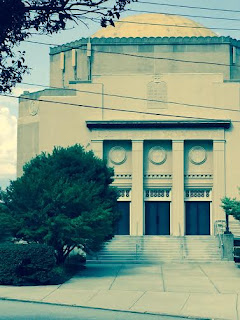Some of you dear dauntless readers may be wondering - whence the curious title
Stubborn Grew? That's an easy one. We're still in the first chapter of the poem, called "Shakespeare's Head" (- name of Providence building, remember? It's the "headache of a rational animal" - recall I was reading Aristotle's
Poetics at the time, which is an analysis of tragic dramatic poetry. Thus the poet plays an antic-tragic Hamlet living in a
hamlet.)
"Stubborn grew" is part of the last line in the first section below. "The rose", of course, is love, & poetry, & all... it's also "Little Rhody"...
This was one of the first sections of the poem written. James Ravlin was my maternal uncle, father of Juliet. A handsome, rakish raconteur - something Irish in him from both sides of family. A Navy vet of WW2, served on a battleship in the Pacific. Worked as lawyer in Louisville, KY for the cigarette companies. Married, divorced, drank, & later in life lived with
Agnes Eisenberger, across the street from Lincoln Center. Agnes was a musical agent, originally from Vienna, for such figures as flutist Jean-Pierre Rampal, et al.
On Dec. 7, 1971 (Pearl Harbor Day), his daughter Juliet jumped off the Golden Gate Bridge. It was his birthday.
6
in memoriam James N. Ravlin, 1912-1997
Light quick mosquitoes speed flitter
and slide at latter-day angle easily
mounting every corniced ingle
and fuming, spuming, better, better and better.
Mosquitoes there were in Saskatchewan,
where you were born, between
Granddad's grain
elevators, Grandma's steel-eyed span.
Those clever, clever lips hovered
in camel smoke
like a Cheshire hookah, smiled.
And tumbled out an accent stranger
and stranger. What flute
troubled earth to bear him?
The bare tongue-footed ague of him?
The sweet-eyed flourish, the high note
of his Viennese liner? Where now,
sailor man, handsome PT-boat boy-o?
He sleeps in his long canoe. He is
scattered. . . a late Minnesota snow.
Unmoored from the height of land,
drifting from Lawrentian divide,
blueberry, pine, air-filled
cliff, the taste of iron.
The cherry trees and the dogwood
bloom now in this sinner-town.
Pale green sprays tender
over the graveyard.
Soon come the clever mosquitoes,
the new swarms. I inch along.
A snail, with prairie on my tongue.
Hesitant, grieving, stubborn grew, the rose.
7
The story begins when the rose turns to clay.
Slippery, niggling, the clay wriggled, sly and monotonous.
And the little hamlet followed, semi-conscious,
not saying what to do, either, nor doing what to say.
The rose inched off into the deep, so murmurous,
and the Prince – well, the Prince did a lie burial
off the stern end of the prow. . . So mercurial,
that one! – like a cow-catcher off a caboose.
Quite realistic it was, too. The waves were majestic
purple mountains, and he went down and down,
without a line, without an inkling –
it was a swoon sans the usual royal encaustum (to make it stick).
That quick-fingered ingle of his made such an impression
he didn't dare exhale–inhaling was out of the question –
so he simply inched his way across that little island,
eyes closed, swimming like a swami, sorely moribund.
And lurking here and there for the entrance underwater.
The truth was it was sub rosa–so they slay,
anyway – that's the tragedy;
he was probably pretty prodigal, and definitely fatter,
they all agreed. Well, it was nice knowing him.
Let's go have a wake-me-up.
These triple plays are all made up,
they seem to me. We inched our way around the scrim
and got out of there before the heavy snow fell.
Good night, dear diary.
Good night. Good night, lady.
Good knight – please save me! I've been playing like hell!
Where did we see that one? Turn it off.
The couch inched down toward the muddy river, slowly,
slowly. What sort of shofar blows so melancholy?
The wind. . . inhale. The wind plays rough.
8
in memoriam Juliet Ravlin, 1952-1972
She was light on her feet,
came like somebody's pickpocket,
a reedy bulb in a clay socket,
springing complete
from the seasoned forehead.
She was light, she was twenty-two
just-once, and so were you;
and then she was wed,
or dead, or had – and Hamlet
went mad. . .
He was still an undergrad
up there on the hill, collegiate,
collecting himself for the big leap
just as she took to the air;
she wasn't anywhere,
and he became – a creep.
She was his Golden Gate,
everybody remarked;
his life was parked
there, checkmate.
Little they knew it was his birthday.
Sail on, boy-o, toward Cuba;
these black squares from Yoruba
yoo-hoo the voodoo. The king must die.
Or so they said. Hamlet's a masquerade,
said Felix. Drive any street,
you're bound to meet.
You're bound. To meet. And. Fade.
So the woods came to the dunce, the forest
became the aptest stern mast, and
Hamlet became himself. Understand?
The end. The grim wonder was all for the best.


















